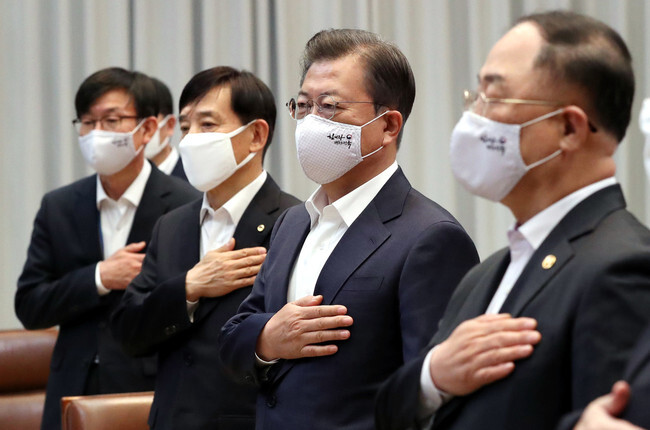hankyoreh
Links to other country sites 다른 나라 사이트 링크
S. Korea to pursue “New Deal” for post-virus economic recovery

The South Korean government plans to spend 85 trillion won (US$69.2 billion) to prevent mass unemployment amid the novel coronavirus pandemic, including support for seven mainstay industries and other businesses facing liquidity crises and the creation of 550,000 public sector jobs and jobs for young people. It has also announced plans to pursue a “South Korean New Deal” for post-virus economic recovery, which would encompass policies related to unemployment, digital technology, social overhead capital, and the social safety net.
These were among the features of special employment stability measures and a business stabilization plan to protect jobs announced at a fifth emergency economic meeting presided over by President Moon Jae-in on Apr. 22.
The special employment stability measures involve spending 10 trillion won (US$8.14 billion) to keep jobs and support livelihoods for 2.86 million workers. They include the creation of 550,000 public sector jobs and young people, as well as the payment of “emergency employment stability support” of 500,000 won (US$407) a month for three months to 930,000 people who do not benefit from employment insurance, including microbusiness operators, people on unpaid leave, “special employment” workers, and freelancers.
A total of 520,000 employed persons stand to be protected through the payment of 500,000 won a month for three months in the event that companies keep them employed on unpaid leave. Livelihood and re-employment support are also to be provided to 860,000 unemployed persons and job-seekers. The government explained that the scope of the support is 2.5 times larger than the number of unemployed persons last year (1.15 million) and constitutes around 40% of this year’s job budget of 25.5 trillion won (US$20.75 billion).
A “mainstay industry stability fund” of 40 trillion won (US$32.56 billion) is also being established to support seven mainstay industries (aviation, shipping, shipbuilding, automobiles, general machinery, power generation, and communications) that are facing serious business struggles amid the virus’s impact. With the funding coming out of taxpayer money, the support is to be made conditional on factors including the retention of jobs over a certain period of time, efforts to prevent moral hazard by managers, and sharing of profits after normalization has been achieved.
Also, another 35 trillion won (US$28.5 billion) is to be added to a previous 100 trillion won (US$81.37 billion) livelihood and financial stability package to establish funds for businesses. In particular, a special purpose vehicle (SPV) is to be established to purchase corporate bonds and commercial papers with low credit ratings, while capital support for small business owners is to be increased by 10 trillion won (US$8.14 billion).
"Preserving jobs is the key task in overcoming the national crisis and the most pressing survival issue,” Moon said, urging the "swift development of the third supplementary budget and related legislation needed for these measures.” He also announced plans to support innovation-led growth in the "post-corona era” through the pursuit of a large-scale stage effort.
"I'd like to see a planning team established quickly to pursue a 'South Korean New Deal’ as a large-scale state project,” he said.
By Lee Kyung-mi, staff reporter
Please direct comments or questions to [english@hani.co.kr]

Editorial・opinion
![[Column] Has Korea, too, crossed the Rubicon on China? [Column] Has Korea, too, crossed the Rubicon on China?](https://flexible.img.hani.co.kr/flexible/normal/500/300/imgdb/original/2024/0419/9317135153409185.jpg) [Column] Has Korea, too, crossed the Rubicon on China?
[Column] Has Korea, too, crossed the Rubicon on China?![[Correspondent’s column] In Japan’s alliance with US, echoes of its past alliances with UK [Correspondent’s column] In Japan’s alliance with US, echoes of its past alliances with UK](https://flexible.img.hani.co.kr/flexible/normal/500/300/imgdb/original/2024/0419/2317135166563519.jpg) [Correspondent’s column] In Japan’s alliance with US, echoes of its past alliances with UK
[Correspondent’s column] In Japan’s alliance with US, echoes of its past alliances with UK- [Editorial] Does Yoon think the Korean public is wrong?
- [Editorial] As it bolsters its alliance with US, Japan must be accountable for past
- [Guest essay] Amending the Constitution is Yoon’s key to leaving office in public’s good graces
- [Editorial] 10 years on, lessons of Sewol tragedy must never be forgotten
- [Column] A death blow to Korea’s prosecutor politics
- [Correspondent’s column] The US and the end of Japanese pacifism
- [Guest essay] How Korea turned its trainee doctors into monsters
- [Guest essay] As someone who helped forge Seoul-Moscow ties, their status today troubles me
Most viewed articles
- 1[Column] The clock is ticking for Korea’s first lady
- 2Samsung barricades office as unionized workers strike for better conditions
- 3[Correspondent’s column] In Japan’s alliance with US, echoes of its past alliances with UK
- 4After 2 months of delayed, denied medical care, Koreans worry worst may be yet to come
- 5[Column] Has Korea, too, crossed the Rubicon on China?
- 6Hong Se-hwa, voice for tolerance whose memoir of exile touched a chord, dies at 76
- 7US overtakes China as Korea’s top export market, prompting trade sanction jitters
- 8All eyes on Xiaomi after it pulls off EV that Apple couldn’t
- 9[Photo] Smile ambassador, you’re on camera
- 10[News analysis] After elections, prosecutorial reform will likely make legislative agenda